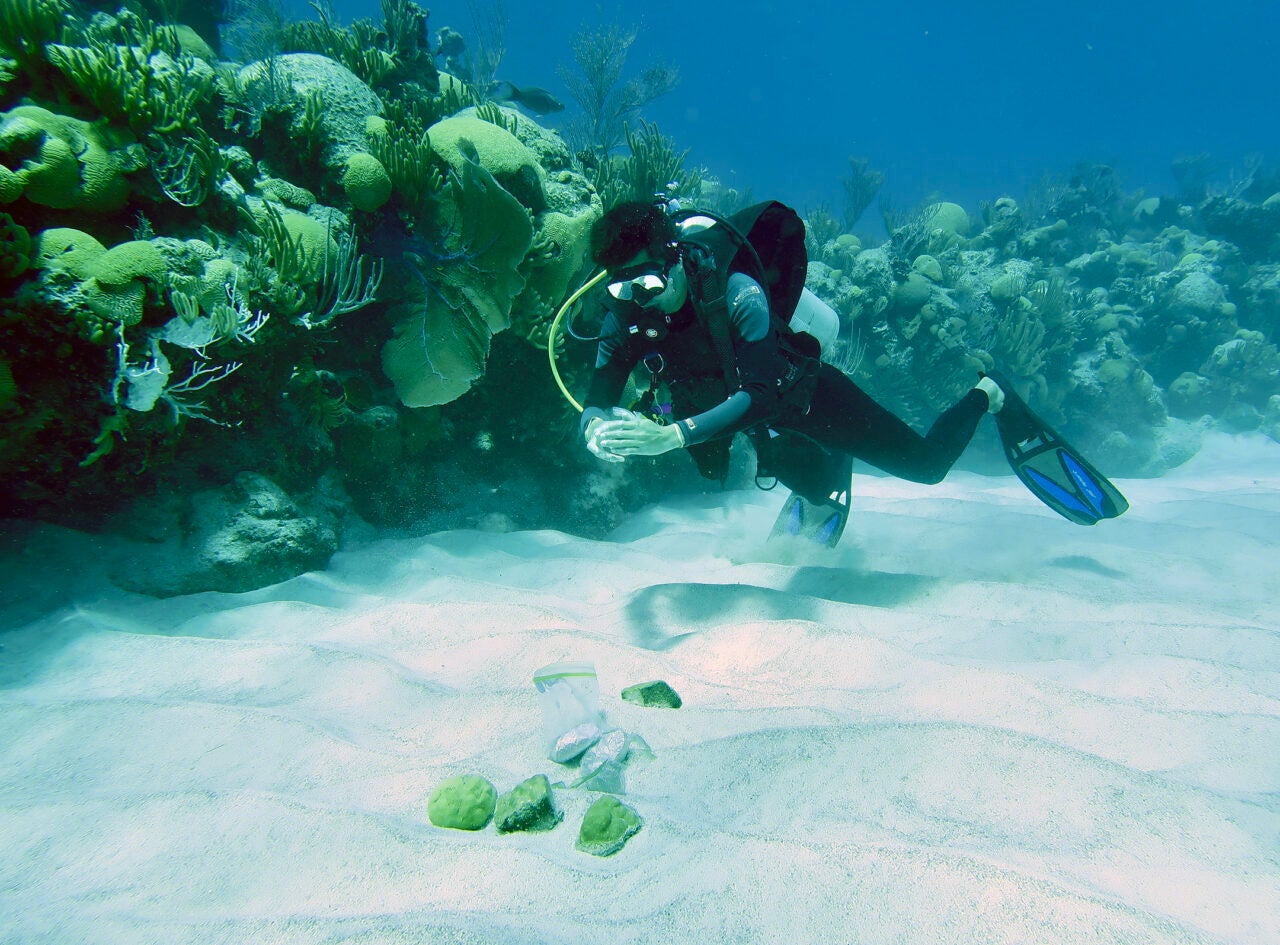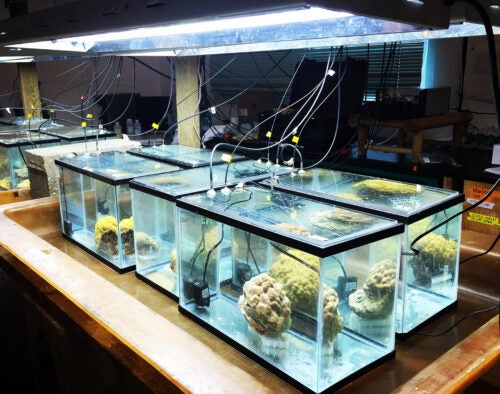Ocean warming and coral survival

URI doctoral student, Kevin Wong, transplanting adult corals via SCUBA at Hog reef in Bermuda using underwater cement.
Researchers find that aspects of
climate change events can lead to more resilient coral offspring, able to
acclimate to new environmental factors
A two-year research project
involving University of Rhode Island scientists demonstrated that offspring,
coming from adult corals that had survived high-intensity environmental
stresses such as bleaching events, are better suited to survive in new
environments.
This means that parent corals that
experience sub-lethal heat stressors may be able to “pre-condition” their
offspring to survive in new environments in the following year.
 |
| Adult Porites astreoides colonies in the laboratory at BIOS where photosynthetic and respiration rates were measured. |
The findings were published in the journal, Global Change Biology, with URI doctoral student Kevin Wong serving as first author. The team also included URI doctoral student Danielle Becker, URI Associate Professor Hollie Putnam and colleagues from Bermuda.
The
article sheds some important light on how corals may respond to heat events,
including both gradual surface temperature increases and more extreme, acute
heat events. The team conducted its research at coral reef sites near Bermuda.
Such findings are important since
coral reefs are the backbone of marine ecosystems. They serve a number of
vitally important purposes including providing a complex habitat for fish, and
also protecting shorelines from erosion. The impact that the health of coral
systems has on local and global economies, whether relating to the fishing or
tourism industries, is extremely significant.
Coral research, including that
conducted by URI researchers, has been spurred on, in recent years, by climate
change and, specifically, increased ocean surface temperatures, which could
threaten the future viability of coral reefs.
This recent research project deepens
scientists’ understanding of how long- and short-term parental environmental
history can shape offspring characteristics, potentially leading to increased
resiliency.
It was the first research project of
its kind to apply longer term and shorter term thermal stress in multiple
sequences to determine which type of stressor affected the corals the most.
Through a complex and unique experimental design, the researchers suggest that
sub-lethal stressors could actually be beneficial to future coral
offspring.
Putnam noted, “The coral used in
this study is a notoriously resilient coral and these findings potentially
demonstrate how this species is so persistent across the Caribbean. Not
all coral species are this robust to environmental stressors. This design of
this experiment allowed us to unravel the mechanisms leading to coral acclimatization
and resilience.”
The multi-year field and lab-based
study, conducted by Wong, Becker, Putnam, and Bermuda Institute of Ocean
Sciences marine ecologists Samantha de Putron and Gretchen Goodbody-Gringley
and Alex Chequer, began in 2017 and involved collecting adult colonies of the
notoriously resilient coral species, Porites astreoides,
from two reef sites northwest of Bermuda. The two sites differ largely in
environmental conditions, as Crescent Reef is a shallower lagoon environment,
while, Hog Reef, is a barrier reef and more exposed to open ocean conditions.
Live corals were transplanted to a
newly constructed mesocosm facility at the Bermuda institute, which was built
with funds from Heising-Simons Foundation International, Ltd. The facility
allowed researchers to control and adjust water temperatures in the tanks for
the study. After collecting baseline data, “pulse” thermal stress events were
simulated for 21 days over the coral’s reproductive period.
Adult corals were halved and
reciprocally transplanted to both reef sites. This means that half of the adult
colony went to a new site, and the other half went to its originating site. The
corals were collected again in the summer of 2018 so researchers could compare
the physiologies of the adult coral and their offspring to their findings from
the previous year.
The unique design of the experiment
allowed the researchers to understand how the combinations of different thermal
disturbances impact how adult corals function and their reproductive characteristics
over prolonged time periods. This question is critical, as identifying the
types of thermal events that impact corals the most (i.e. gradual sea surface
temperature increase or marine heat waves) could aid in management decisions
and improve the future of coral reefs.
The study showed that although adult
corals were able to recover from the pulse thermal event one year later, this
intense sub-lethal event altered their offspring, suggesting lasting carryover
effects of this specific event one year later. This has important implications
on how corals could rapidly respond to thermal stress events and prepare the
next generation of corals for adverse conditions.
“We know parental history influences
the characteristics of offspring in corals, however, the experimental design
used in this study provides us with a unique perspective on how multiple types
of thermal events can accumulate over time and have lasting consequences across
generations,” said Wong.
The abstract for the paper published
in Global Change Biologycan be found here. This research study was supported by the Heising-
Simons Foundation International Ltd., Bermuda Institute of Ocean Sciences
(BIOS) Grant-In-Aid, Canadian Associates of BIOS Scholarship, BIOS University
Programs Department, and a National Geographic Young Explorers grant.